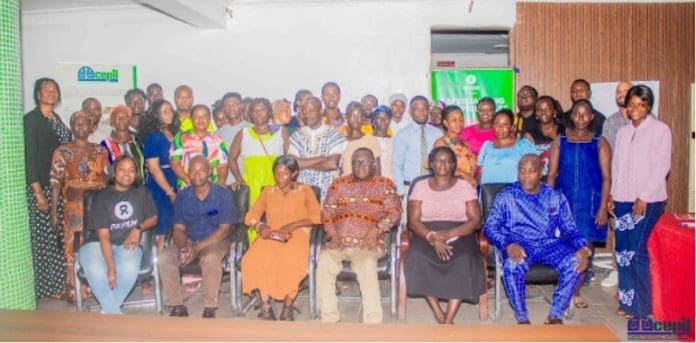In a significant stride toward legal empowerment, the Centre for Public Interest Law (CEPIL), in collaboration with the Centre for Social Impact Studies (CeSIS) and Oxfam in Ghana, has officially launched a simplified Twi Guide on Land Compensation Laws.
The event, held at the Mawuli Hotel in Obuasi, aimed to dismantle complex legal barriers for marginalised communities facing the impacts of mining operations.
The gathering brought together 42 participants, creating a vital space for dialogue among community members from Obuasi, Ashanti, and Kenyase 1 & 2 in the Ahafo Region, government and municipal assembly officials, representatives from AngloGold Ashanti, Civil Society Organisations (CSOs), and local media outlets.
In a welcome address, a Legal Advocate at CEPIL, Mr. Alhassan Iddrisu, on behalf of the organisers acknowledged CEPIL’s 26-year history of providing legal support to marginalized groups but highlighted a persistent crisis.
“Despite years of legal interventions, mining-affected communities continue to struggle with unresolved challenges,” he stated.
He pointedly accused mining companies of being “driven primarily by the goal of profit maximisation,” often at the expense of community rights, which fuels persistent conflicts.
He drew stark attention to “escalating environmental challenges,” including land degradation and water pollution, and disturbingly noted reports of violence and killings in mining zones.
According to him, the lack of effective redress mechanisms continues to deepen “mistrust, insecurity, and social unrest.”
Mr. Iddrisu seized the chance to express appreciation to Oxfam in Ghana for their crucial funding and support.
The core of the event was a detailed presentation on “Resettlement and Compensation: Legal and Regulatory Framework,” facilitated by the Lead Consultant at CeSIS, Mr. Richard Ellimah,
In a deliberate move to ensure inclusivity, his presentation was delivered primarily in Twi (a local dialect in Ghana).
Mr. Ellimah began by clarifying the constitutional principle of “compulsory acquisition” under Article 20 of the 1992 Constitution, explaining it as the state’s power to acquire private land for public interest, but with the strict obligation to provide “prompt, fair, and adequate compensation” and ensure resettlement does not worsen living standards.
He then provided a comprehensive breakdown of the national legal framework, translating complex acts into practical implications for the attendees: Minerals and Mining Act, 2006 (Act 703): Establishes mineral rights and the entitlement to compensation; Minerals and Mining (Compensation and Resettlement) Regulations, 2012 (LI 2175): Details procedures for compensation and resettlement, though enforcement remains inconsistent and Land Act, 2020 (Act 1036): Consolidates land laws and provides mechanisms for transparency and dispute resolution.
He further explained that Lands Commission Act, 2008 (Act 767): Mandates the Lands Commission to regulate land management and compensation; Environmental Assessment Regulations, 1999 (LI 1652): Links environmental impact to community displacement, Land Use and Spatial Planning Act, 2016 (Act 925): Ensures resettlement aligns with orderly development, and National Land Policy (1999): Outlines Ghana’s vision for equitable land governance.
Mr. Ellimah also referenced international best practices, such as the World Bank’s Involuntary Resettlement Standards, which stress that affected persons should be supported to restore or improve their livelihoods—a principle often missing in local practice.
A key part of his presentation focused on the critical failure of Grievance Redress Mechanisms. He explained that without accessible and transparent complaint-handling systems, communities are left with no recourse, widening the trust gap between them, companies, and government agencies.
In his concluding remarks, Mr. Ellimah positioned the Twi Guide as far more than a translated document. “It is a practical empowerment tool,” he urged, equipping communities to “hold institutions accountable, to negotiate fairly, and to insist on justice.”
The launch also featured the introduction of parallel legal support services for human rights and environmental violations reported through CEPIL’s whistleblower portal, creating a complete pathway from legal education to actionable justice for mining-affected communities across Ghana.
Story By: Alfred Asamoah
Source: newsghana.com.gh











